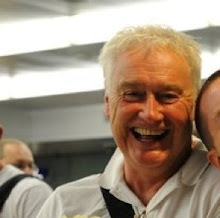at The Print Room, London W2.

In 1985, Susan Wooldridge (centre) made her name as Daphne Manners in ‘The Jewel In the Crown’ by having a nasty shock in an overgrown garden. You turn your back for 25 years and she’s at it again this time in a tense and twisting three-hander by Alan Ayckbourn which - in his 61st script - combines his well-documented empathy for the anguish of suburban womanhood with an unfulfilled ambition to write a ‘serious’ play.
Wooldridge is solidly middle-middle class Annabel Chester who returns - after thirty years and a failed marriage in Tasmania - with Barbour and headscarf but no trace of Australian accent to inherit the family home, and to spar uneasily with her sister Miriam who has tended their ailing father until reaching the end of her tether. This could be Ayckbourn re-working Sarah and Annie from 'The Norman Conquests' (the characters on which Barbara and Margo were based for 'The Good Life' as a matter of fact) if it weren't for the suggestion that Miriam may just - slightly - have overdosed papa with his medication and – ever so gently – pushed him down the stairs.
It could go either way - spirited comic banter, or kitchen sink meltdown if the situation weren't complicated by the arrival of father's long-serving but recently-sacked nurse, played by Mossie Smith as a muscular prole with the stomping energy of a cage fighter looking to land her first punch on the square jaw of Wooldridge's clumsily bombastic Tory bitch - and with a nice sideline in blackmail.
They're well-matched if somewhat stock characters, so it's Miriam who captures the audience's attention in Sarah Woodward's intelligently finessed performance. She has the slight advantage that the author gives her the best lines and the most interesting motivations, but this is a naturalistic acting of the highest calibre.
It's this naturalism which helps resist the decline of the piece into schlock as it becomes a sinister ghost story through Ayckbourn’s cleverly controlled gradual escape of the darker detail of the disturbed relationships each of the women has had with the men in her life, and with each other.
The atmospherics are enabled superbly by William Dudley’s magisterially dilapidated tennis court set - how did they persuade such an ace designer to work in a relatively unknown fringe venue - and which could be a metaphor for the dessication of middle class society complete in every detail down to the rusted mower and dried out grass, and equally by Richard Howell’s creepily effective lighting and Neil Alexander’s subtle sound patterns.
There are flaws: the plotting will be easily anticipated by anyone who’s seen ‘Deathtrap’ or ‘Sleuth’ – the clues are so obviously planted they could come with potting shed labels, but director Lucy Bailey controls the pacing carefully to heighten the tension, and there’s every chance the hairs on the back of your neck will rise more than once before the denouement.
versions of this review appeared on ThePublicReviews and Londonist




No comments:
Post a Comment